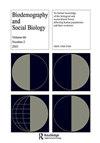Do subjective or objective cognitive measures better predict social network type among older adults?
IF 0.9
4区 社会学
Q3 DEMOGRAPHY
引用次数: 1
Abstract
ABSTRACT A large literature highlights the link between cognitive function and social networks in later life. Yet there remains uncertainty about the factors driving this relationship. In the present study, we use measures of subjective cognitive decline and clinical cognitive assessments on a sample of older adults to investigate whether the relationship between cognitive function and social networks is driven by psychosocial factors. We found a consistent link between clinical cognitive assessments and social network type, but no association between subjective concerns of cognitive decline and networks. Participants who exhibited signs of clinical cognitive impairment were more likely to have restricted networks (i.e., smaller networks consisting of fewer contacts, more interconnectivity, and less social diversity) compared to their cognitively normal counterparts, regardless of subjective measures of cognitive decline – both from the participant’s perspective and study partner’s perspective. These findings suggest that neither cognitively impaired older adults nor their network members appear to consciously dissolve social ties on the basis of perceived cognitive decline. However, it remains unclear whether the association between clinical cognitive impairment and social network type indicates the protective nature of social networks against cognitive decline or a subconscious process leading to social contraction.

主观或客观认知测量能更好地预测老年人的社会网络类型吗?
大量文献强调了认知功能与晚年社会网络之间的联系。然而,推动这种关系的因素仍存在不确定性。在本研究中,我们使用主观认知衰退和临床认知评估对老年人样本进行测量,以调查认知功能和社会网络之间的关系是否由社会心理因素驱动。我们发现临床认知评估与社会网络类型之间存在一致的联系,但认知能力下降的主观担忧与社会网络之间没有关联。与认知正常的参与者相比,表现出临床认知障碍迹象的参与者更有可能拥有有限的网络(即由更少的接触、更多的互联性和更少的社会多样性组成的更小的网络),无论从参与者的角度和研究伙伴的角度对认知衰退进行主观测量。这些发现表明,无论是认知受损的老年人,还是他们的网络成员,似乎都不会在认知能力下降的基础上有意识地解除社会关系。然而,临床认知障碍与社会网络类型之间的联系是否表明社会网络对认知衰退的保护性质或导致社会收缩的潜意识过程仍不清楚。
本文章由计算机程序翻译,如有差异,请以英文原文为准。
求助全文
约1分钟内获得全文
求助全文
来源期刊

Biodemography and Social Biology
Multiple-
CiteScore
1.50
自引率
0.00%
发文量
14
期刊介绍:
Biodemography and Social Biology is the official journal of The Society for the Study of Social Biology, devoted to furthering the discussion, advancement, and dissemination of knowledge about biological and sociocultural forces affecting the structure and composition of human populations. This interdisciplinary publication features contributions from scholars in the fields of sociology, demography, psychology, anthropology, biology, genetics, criminal justice, and others. Original manuscripts that further knowledge in the area of social biology are welcome, along with brief reports, review articles, and book reviews.
 求助内容:
求助内容: 应助结果提醒方式:
应助结果提醒方式:


